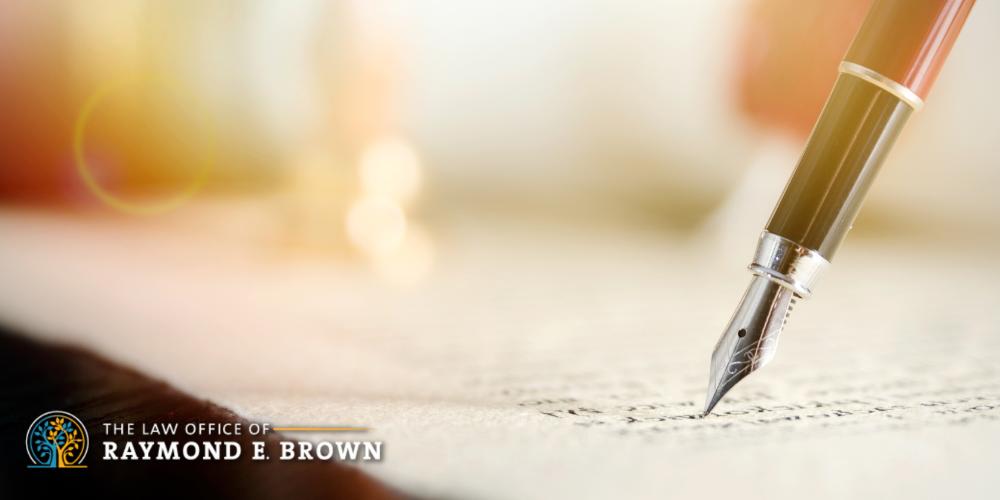Being named as an executor is not just an hodinor but also a significant responsibility. It requires a thorough understanding of legal and financial matters, a commitment to carry out the deceased person’s wishes, and the ability to navigate complicated administrative tasks.
If you’ve been named the executor of a will, the Annapolis estate planning attorneys from The Law Office of Raymond E. Brown are here to provide you with an overview of duties, helping to ensure that you are prepared for the responsibilities of this role.
To schedule a consultation with a knowledgeable Annapolis estate attorney from The Law Office of Raymond E. Brown, call (443) 554-9944 today!
What Does the Executor of a Will Do?
As the executor of a will, your primary duty is to honor the deceased’s final wishes and manage estate administration tasks. This includes safeguarding and managing assets like real estate, investments, and personal property. You’re also responsible for settling debts and liabilities, which involves identifying creditors, verifying claims, and ensuring debts are paid lawfully. You must also handle any tax-related matters, including filing the estate tax return.
An important part of your role is distributing inheritances to beneficiaries according to the will, requiring careful interpretation of the deceased’s wishes and managing potential beneficiary conflicts. You’ll also navigate probate court procedures, file legal documents, and notify relevant government agencies about the death.
Maintaining accurate and detailed records of all estate transactions and decisions is crucial for transparency, dispute resolution, and potential audits. As the personal representative for the probate estate, your role is integral in ensuring the deceased’s wishes are fulfilled with integrity and legal compliance.

Locate and File the Will with the Local Register of Wills
The first task for an executor is to locate and file the will with the local register of wills or probate court. This process signifies the formal initiation of the will’s execution. Once the estate executor locates the will, they must check to make sure it’s the most recent version and then file it with the register of wills in the county where the deceased resided.
Obtain Letters of Administration
The probate court issues the letters of administration and serves as official recognition and validation of the executor’s role. With the letters of administration in hand, the executor is empowered to act on behalf of the estate, including accessing bank accounts, handling property transactions, and dealing with various financial and legal matters. This document is essential for demonstrating the executor’s legal capacity to multiple institutions and agencies, ensuring a smooth and compliant execution of the estate’s affairs in line with the will’s directives.
Notify Beneficiaries and Heirs
An important responsibility of an executor is to notify all beneficiaries and heirs as outlined in the will. This step involves reaching out to each individual named in the will, informing them of their inclusion and the nature of their inheritance. The executor must also identify and contact any legal heirs who may not be explicitly named in the will but are entitled to notification under state law.
Inventory and Appraisal of Estate Assets
One of the executor’s key duties is to conduct a thorough inventory and appraisal of the estate’s assets. This process involves identifying, cataloging, and assessing the value of all assets within the estate, including real estate, bank accounts, investments, personal property, and other tangible items. The executor must ensure a precise and fair valuation, which often requires the expertise of professional appraisers.
Manage the Estate
Managing the estate requires diligent oversight and administration of the deceased’s assets throughout the probate process. This role involves safeguarding property, maintaining or liquidating assets as appropriate, and ensuring the estate’s financial obligations, such as debts, taxes, and ongoing expenses, are met. The executor must also make decisions regarding investments and manage any income generated by the estate assets.
Pay Debts and Taxes
As the executor, a pivotal duty is to manage the estate’s financial obligations, including settling debts and preparing the estate income tax return. This process involves thoroughly reviewing and paying all outstanding debts, such as personal loans, credit card bills, and any liabilities linked to the deceased’s bank account. In addition to debt settlement, a key responsibility is the accurate preparation and filing of income tax returns for the estate, including reporting any income generated through the decedent’s assets.
Distribute Assets to Beneficiaries
One of the most important jobs of an executor is distributing the estate’s assets to the beneficiaries as outlined by the deceased person. This stage involves carefully allocating the estate’s assets to the designated individuals. The executor must adhere strictly to the instructions in the will, ensuring each beneficiary receives exactly what was intended for them.
Maintain Accurate Records
Maintaining accurate records is an indispensable part of being an executor. This responsibility entails keeping detailed accounts of all actions and transactions related to the estate. Every step must be carefully recorded from the initial inventory of assets, recording expenses and debts paid, and documenting the distribution of assets to beneficiaries.
File Required Documents with the Probate Court
Filing required documents with the probate court is a key responsibility of an executor, marking the formal progression of estate administration. This task involves submitting a range of legal documents, including the original will, death certificate, inventory of the decedent’s estate assets, and various court forms. These documents are essential for obtaining legal authority to manage and distribute the estate’s assets. The probate court reviews these filings to ensure compliance with legal standards and to oversee the fair and lawful execution of the will.
Close the Estate
Closing the estate is the last step in the executor’s duties. This process ensures that all probate assets have been properly accounted for, debts and estate taxes are settled, and inheritances are distributed to the beneficiaries as per the will. The executor then prepares a final accounting, a comprehensive report detailing all transactions and actions taken during the estate administration. This report is submitted to the probate court for approval, and notice is given to all interested parties, allowing them to review and raise any objections. The executor can formally close the estate once the court approves the final accounting and any issues are resolved.
Act in the Best Interest of the Estate
Acting in the estate’s best interest is an executor’s fundamental obligation, encompassing the ethical and legal responsibility to manage the estate with diligence, honesty, and integrity. This duty requires the executor to prioritize the estate’s interests above personal gains or external influences. It involves making decisions that maximize the estate’s value for the benefit of the beneficiaries, such as prudent management of assets, fair and impartial handling of disputes, and ensuring compliance with all legal and tax obligations. The executor must also avoid conflicts of interest and maintain transparency in all dealings related to the estate.
Can an Executor Decide Who Gets What?
An executor has no authority to decide who gets what from the estate; they execute the deceased’s wishes as outlined in the will. The will specifies the distribution of assets among beneficiaries, and the executor’s responsibility is to follow these directives accurately and impartially. In cases where the will is vague or silent on certain matters, the executor may have some discretion, but this must still be exercised within the framework of the will’s intentions and applicable state laws.

What an Executor Cannot Do
While executors have significant responsibilities in managing and distributing an estate, their powers are not unlimited. They must operate within the boundaries of will, the law, and ethical standards.
In this section, we will explore the constraints on an executor’s power, such as their inability to alter the will’s provisions, misuse estate funds, or make decisions based on personal interests. Understanding these limitations is crucial for executors to avoid legal pitfalls and to fulfill their duties effectively and lawfully.
Engage in Self-Dealing
Self-dealing occurs when an executor uses their position to personally benefit from the estate’s assets rather than acting in the best interests of the beneficiaries and the estate. Examples include buying property from the estate at a below-market price or favoring personal interests over those of the beneficiaries. Such actions can lead to conflicts of interest and compromise the integrity of the estate administration.
Mismanage Estate Assets
An executor must manage the estate’s assets responsibly and in line with the best interests of the beneficiaries. Mismanagement can take various forms, such as neglecting property upkeep, making poor investment decisions, or failing to collect debts owed to the estate. Such actions can devalue the estate and adversely affect the beneficiaries’ inheritances. Executors must exercise due diligence, seek appropriate professional advice from an experienced probate lawyer when necessary, and adhere to the guidelines outlined in the will and by law.
Ignore the Will’s Instructions
The executor’s main job is to carry out the deceased’s wishes. Deviating from these instructions, whether by distributing assets to non-beneficiaries, altering the proportions of inheritance, or disregarding specific bequests, undermines the integrity of the role and violates the fiduciary trust. The executor’s role is to implement, not interpret or modify, the deceased’s stated intentions.
Withhold Information from Beneficiaries
Transparency and open communication are key responsibilities of an executor. Beneficiaries have a rightful interest in the estate. They are often entitled to information about the estate’s status, including asset distribution, expenses, and the handling of debts and taxes. An executor who fails to provide information or obscures details violates their fiduciary duty and potentially sows discord among the beneficiaries.
Show Favoritism Among Beneficiaries
An executor is legally and ethically obligated to treat all beneficiaries impartially, regardless of personal relationships or affiliations. Favoritism can manifest in unequal asset distribution, prioritizing one beneficiary’s interests over others, or delaying distributions without a valid reason. These biased actions breach the executor’s duty to act in the best interest of the estate and all its beneficiaries and risk legal repercussions, including disputes, litigation, and potential removal from the executor’s role.
Distribute Assets Prematurely
The executor’s role demands that all debts, taxes, and administrative expenses of the estate be fully settled before any remaining assets are distributed to beneficiaries. Jumping to distribution without clearing these obligations can lead to significant legal and financial complications. Premature distribution might result in insufficient funds to cover the estate’s debts and taxes, potentially placing the executor in a position of personal liability.
Fail to File Required Documents and Tax Returns
Executors must file necessary legal documents with the local probate court, including the will, inventories, and accountings, in a timely and accurate manner. They must diligently prepare and file all required tax returns, such as income tax returns for the estate and estate tax returns. Neglecting these obligations violates legal requirements and can result in financial penalties, legal disputes, and delays in the estate settlement process.
Neglect Creditors’ Claims
Executors are legally obligated to identify, verify, and address all legitimate debts and claims against the estate. Failure to do so can lead to serious legal consequences, including potential personal liability for the executor. Neglecting creditors’ claims not only undermines the orderly settlement of the estate but can also lead to legal disputes and challenges from creditors. Executors must diligently investigate and satisfy all valid debts and claims, ensuring the estate’s obligations are met before asset distribution to beneficiaries.
Make Unsupported Decisions
Making unsupported decisions as an executor is a risky practice that should be avoided. Executors must base their decisions on sound legal, financial, and ethical grounds supported by relevant documentation and professional advice when necessary. Unsupported decisions can result in disputes, legal challenges, and personal liability for the executor.
Relying on factual information, legal guidance, and adherence to the will’s provisions ensures that the executor’s actions are well-founded and withstand scrutiny, contributing to the lawful administration of the estate.
Receive Excessive Compensation
Executors are entitled to compensation for administering the estate, often determined by state law or the will. However, demanding or accepting compensation that exceeds what is appropriate can result in disputes with beneficiaries, legal challenges, and potential removal from the executor role. Executors must be transparent and fair in their compensation arrangements, ensuring they align with the estate’s administration and adhere to legal guidelines.
Amend the Will
Amending the will is an action that falls entirely outside an executor’s authority. The will represents the final and legally binding expression of the deceased’s wishes, and an executor has no power to alter its provisions in any way. Attempting to amend the will to benefit oneself or others is a serious breach of fiduciary duty and legal ethics. Executors must respect the will’s directives and carry out their duties accordingly. Any necessary changes to the will should be made through a formal legal process.
Ignore Court Orders
Probate courts issue orders to guide and regulate the estate process, and it is imperative for executors to comply with these orders promptly and completely. Failure to adhere to court orders can result in legal penalties. It also undermines the integrity of the probate process and can lead to disputes among beneficiaries, creditors, or other interested parties.

For Assistance Executing a Will in Maryland, Call Annapolis Estate Planning Attorney Raymond E. Brown Today
Executing a will is a complex legal process. At The Law Office of Raymond E. Brown, our estate planning attorneys will work with you to ensure that, as the executor, you have all the legal resources needed to execute the deceased’s wishes effectively.
With a commitment to upholding the wishes of the deceased and facilitating a lawful and transparent process, Annapolis attorney Raymond E. Brown is ready to provide the guidance and support necessary for a successful estate administration. Schedule a consultation with one of our experienced Maryland will attorneys by calling (443) 554-9944 today.

